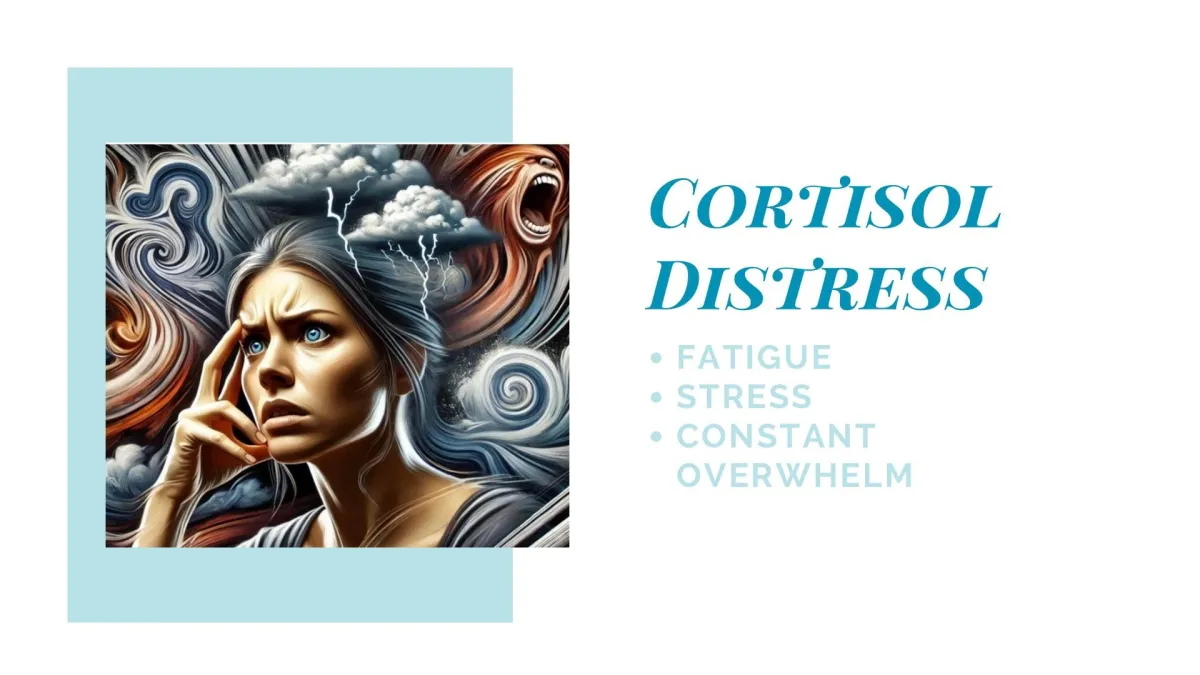
Cortisol Distress: When Stress Hormones Are Running the Show
If you’ve been feeling wired but exhausted, overwhelmed by the smallest things, or waking up at 3 a.m. with your mind racing—this one might hit home. Add in stubborn belly weight, low energy, brain fog, or even a sense that your body is running on fumes, and you’re likely dealing with Cortisol Distress.
Cortisol is your main stress hormone. It’s not bad—in fact, it helps you wake up in the morning, stay focused, and respond to life’s curveballs. But when cortisol is chronically elevated or out of rhythm, it can take a major toll on your body—and make all of your other hormones harder to balance.
What’s Really Going On?
Your body is likely stuck in survival mode.
Whether it’s long-term emotional stress, a go-go-go lifestyle, intense exercise, poor sleep, blood sugar instability, or even past trauma—your nervous system may be sending a constant signal of “danger,” keeping cortisol high when it should be winding down.
Over time, this stress response can disrupt your entire hormonal cascade, including estrogen, progesterone, thyroid, insulin, and even melatonin (your sleep hormone). That’s why so many women with Cortisol Distress feel like everything is “off”—but can’t quite put their finger on what’s causing it.
What if You’re In Perimenopause?
Cortisol Distress often appears during mid to late perimenopause, when hormonal fluctuations make your nervous system more sensitive to stress. You might notice disrupted sleep, feeling more anxious than usual, or having a shorter fuse. If you’ve always “handled it all,” but suddenly feel like you’re falling apart, this could be why. Addressing stress patterns early can prevent burnout from layering on top of your hormone shifts.
But What If You’re Already Postmenopausal?
Cortisol Distress can absolutely show up after menopause—sometimes even more strongly.
Once estrogen and progesterone decline, your adrenal glands take on more responsibility for producing the hormones that help regulate mood, metabolism, and energy. If your adrenals are already taxed from years of chronic stress or burnout, they may not have the reserves to keep up.
That’s why it’s so common for women in postmenopause to feel flatlined, exhausted, moody, or mentally foggy—even if they’re technically “past” the hormone rollercoaster. Your cortisol rhythm may be completely out of sync, and that affects everything from sleep to weight to memory and beyond.

Symptoms You Might Be Dealing With
Waking up tired, but wired at night
Difficulty falling or staying asleep
Anxiety, mood swings, or irritability
Brain fog and trouble concentrating
Belly weight that won’t budge
Sugar cravings and blood sugar dips
Exhaustion after exercise or skipping it altogether
Why This Matters
When cortisol is dysregulated, it creates a domino effect—making it nearly impossible to balance your other hormones or feel truly energized.
You might be doing everything “right”—eating well, working out, taking supplements—but if you’re pushing through a constant stress response, it’s like pouring water into a leaky bucket. Without resetting your nervous system and restoring your body’s stress rhythms, nothing else will stick.
What You Can Do About It
The goal isn’t to eliminate all stress—it’s to help your body feel safe again. That’s when healing and balance begin.
Start by embracing gentler activities that soothe rather than strain. Opt for calming exercises, focus on nourishing meals, and prioritize restful sleep. Even small moments of relaxation—like a deep breath or a quiet pause—can signal safety to your system.
These foundational steps can begin to lower cortisol levels and restore harmony among your hormones.
But to truly break free from the relentless cycle of stress and hormonal imbalance, you need a roadmap tailored to your unique needs. That’s where the Menopause Playbook program comes in.
This isn’t just another generic wellness plan; it’s a personalized journey designed to address the root causes of your Cortisol Distress. With expert guidance, supportive community, and actionable strategies, you’ll gain the tools to reclaim your energy, stabilize your mood, and feel like yourself again.
Don’t let stress dictate your life any longer. Take the first step toward lasting relief and empowerment.
Want a Clearer Path Forward?
If you’re ready to stop running on empty and start feeling grounded again, I invite you to join me inside My Menopause Playbook.
It’s a 4-month group coaching program built around your unique menopause type—like Cortisol Distress. You’ll learn how to calm your stress response, reset your sleep and energy patterns, and finally feel steady in your body again.
You’ll get structure, accountability, and a warm, supportive group of women navigating similar challenges—all with expert coaching and simple strategies that actually work.
And yes—it’s a 4-month commitment. But ask yourself: how long have you been dealing with these symptoms already? And how much longer could they linger if nothing changes?
This isn’t just about short-term relief—it’s about creating a sustainable, steady foundation for your hormones, your energy, and your future health. Because when you give your body the time and support it truly needs, everything starts to shift.
This is your time to step out of survival mode—and into something better.